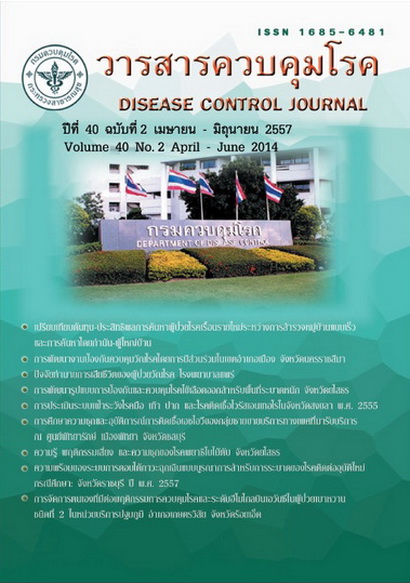Self management on behaviors for controlling disease and HbA1c level in Diabetes Mellitus type 2 patients in the Primary Care Units Kasetwisai, Roi-Et
DOI:
https://doi.org/10.14456/dcj.2014.25Keywords:
self-management, behaviors for controlling, Diabetes mellitus type 2Abstract
Diabetes mellitus has been identified globally as leading cause of death and disability. Patient with uncontrolled diabetes often experience several complications. Promoting proper self-management will help control the disease and reduce application, resulting in improved quality of life. Therefore, the researcher has used the self-management program for patients with diabetes can manage their own behaviors to the appropriate. This study was to a quasi- experimental research were (1) to compare the mean score of behaviors for controlling disease in the experimental group before and after receiving the self-management program and (2) to compare the mean score of behaviors for controlling disease and HbA1c between the experimental group and control group. The sample consisted of 28 type 2 diabetic patients who attended the diabetic clinic at primary care unite of Health Promoting Hospitals Ban Nam Om. They were assigned by matched pair with gender and drug into either experimental group and control group. Fourteen subjects were randomly assigned into an experimental group and 14 subjects were randomly assigned into a control group. The experimental group was designed to join the self-management from 4 steps of Kanfer's self-management (1) goal setting (2) self monitoring (3) self evaluation ,and (4) self reinforcement, while the control group received regular nursing care. The instruments for collecting data was behaviors for controlling disease questionnaire, Which was tested for both validity and reliability with alpha of 0.83. Data were analyzed by using mean, standard deviation, Wilcoxon Matched-Paired Signed -Ranks Test, and Mann-Whitney บ Test. The majors findings were as follows: (1) The patients with type 2 diabetes mellitus who received the self-management program had a higher mean score of behaviors for controlling disease than before receiving the self-management program and had a higher mean score of behaviors for controlling disease than the control group at the 0.05 level of significance. (2) The patients with type 2 diabetes mellitus who received the self-management program had a lower level of HbA1c than before receiving the self-management program and had a lower level of HbA1c than the control group at the 0.05 level of significance, by the experimental group had an average hemoglobin level, HbA1c posttest than the comparison group. In conclusion, the self-management program could have good effects to increase the behaviors for controlling disease and decrease HbA1c level in diabetes mellitus type 2 patients. Therefore, the self-management program should be used with diabetes mellitus type 2 patients and other chronically ill patients for controlling disease.
Downloads
Downloads
Published
How to Cite
Issue
Section
License
Articles published in the Disease Control Journal are considered as academic work, research or analysis of the personal opinion of the authors, not the opinion of the Thailand Department of Disease Control or editorial team. The authors must be responsible for their articles.






